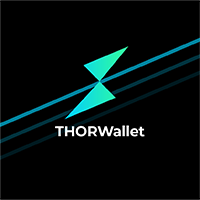Top Wallet tokens by market capitalization
Wallet contains 48 coins with a total market capitalization of $2.07B and an average price change of +0.93%. They are listed in size by market capitalization.
Cryptocurrency wallets are digital tools allowing users to store, manage, and transact with their cryptocurrencies. Just as you'd use a physical wallet to store traditional paper currency and credit cards, a crypto wallet serves the same purpose for digital currencies, but in a more complex manner due to the cryptographic nature of these assets. Cryptocurrency wallets have private and public keys and come in various types: hardware, software, web, and paper wallets. Security is important, as losing access to the private key means losing access to the funds. Users must practice security measures and choose wallets compatible with their desired cryptocurrencies.
See more
| Name | Price | 24h (%) | 7D (%) | Market cap | 24h volume | Supply | Last 24h | Action | |
|---|---|---|---|---|---|---|---|---|---|
| $0.7958 | +1.27% | +0.02% | $331.58M | $9.25M | 416.65M | Trade | |||
 SafeSAFE | $0.4640 | +1.92% | -9.04% | $263.04M | $43.18M | 566.91M | |||
 SafePalSFP | $0.4980 | +1.63% | +0.12% | $248.99M | $7.30M | 500.00M | Trade | ||
 1inch Network1INCH | $0.1775 | +3.61% | -3.15% | $245.99M | $12.83M | 1.39B | Trade | ||
 KadenaKDA | $0.4176 | +4.81% | +6.48% | $130.67M | $5.67M | 312.95M | Trade | ||
 LoopringLRC | $0.09253 | +3.91% | -1.97% | $126.48M | $9.49M | 1.37B | Trade | ||
 SolarSXP | $0.2108 | +21.54% | +20.59% | $134.87M | $175.59M | 639.67M | Trade | ||
 XPR NetworkXPR | $0.003987 | -1.74% | +17.24% | $108.72M | $5.80M | 27.27B | Trade | ||
 Coin98C98 | $0.05667 | +4.34% | +1.63% | $52.93M | $11.86M | 933.89M | Trade | ||
 Particle NetworkPARTI | $0.1966 | +7.90% | +16.28% | $45.82M | $60.00M | 233.00M | Trade | ||
 NYMNYM | $0.04722 | -5.91% | -9.57% | $38.24M | $1.72M | 809.96M | Trade | ||
 AlephiumALPH | $0.3461 | +1.68% | +18.74% | $37.12M | $461,877.49 | 107.24M | Trade | ||
 ElectroneumETN | $0.001639 | -2.43% | -5.10% | $29.48M | $1.70M | 17.98B | |||
 TokenPocketTPT | $0.007230 | +0.31% | +0.18% | $25.06M | $134,837.1 | 3.47B | |||
 StrikeXSTRX | $0.02228 | +0.16% | +10.96% | $22.28M | $936.24 | 1000.00M | |||
 Klever CoinKLV | $0.002217 | +14.99% | +22.35% | $19.69M | $1.96M | 8.88B | Trade | ||
 MATHMATH | $0.1097 | +4.92% | -4.06% | $12.54M | $729,725.13 | 114.36M | |||
 iMe LabLIME | $0.01501 | +1.24% | -12.00% | $11.32M | $481,830.46 | 754.34M | Trade | ||
 FIO ProtocolFIO | $0.01368 | +5.59% | +5.38% | $11.05M | $3.71M | 808.28M | Trade | ||
 Ambire WalletWALLET | $0.01101 | +0.98% | -10.22% | $7.58M | $435,500.38 | 688.59M | |||
 ReefREEF | $0.0003769 | +34.61% | +16.19% | $7.92M | $1.49M | 21.02B | Trade | ||
 DiviDIVI | $0.001366 | +13.67% | -24.33% | $5.81M | $144,381.21 | 4.25B | |||
 CateCoinCATE | $0.{7}8901 | -0.20% | +0.31% | $5.10M | $210,238.28 | 57.27T | |||
 NashNEX | $0.09522 | -2.99% | -1.13% | $4.08M | $0 | 42.86M | |||
 Step AppFITFI | $0.001515 | +2.06% | -2.24% | $3.83M | $1.43M | 2.53B | Trade | ||
 SyloSYLO | $0.0004956 | +5.10% | +0.44% | $2.92M | $1.40M | 5.89B | Trade | ||
 Ctrl WalletCTRL | $0.009395 | +7.20% | -15.08% | $1.92M | $1.18M | 203.93M | |||
 BLOCX.BLOCX | $0.009630 | +2.38% | -0.36% | $963,972.47 | $158,875.19 | 100.11M | |||
 PillarPLR | $0.002266 | +0.03% | +8.19% | $587,613.47 | $12.15 | 259.35M | |||
| $0.03094 | +0.73% | -10.77% | $328,052.82 | $202.49 | 10.60M | ||||
 OneArt1ART | $0.002101 | -4.46% | +60.97% | $301,290.32 | $62,939.47 | 143.42M | |||
 Cirus FoundationCIRUS | $0.001398 | -3.96% | -6.54% | $87,481.5 | $44,039.6 | 62.59M | |||
 BlockWalletBLANK | $0.002360 | +4.49% | -51.77% | $45,764.51 | $46,216.77 | 19.39M | |||
 UTYABSWAPUTYAB | $0.{4}3399 | -- | +12.97% | $33,992.61 | $0 | 1000.00M | |||
 Rice WalletRICE | $0.0008107 | +6.80% | -8.07% | $0 | $0 | 0.00 | |||
 THORWalletTGT | $0.002963 | -2.19% | -66.41% | $0 | $27,378.4 | 0.00 | |||
| $0.3326 | +0.63% | -8.63% | $0 | $0 | 0.00 | Trade | |||
 GiddyGIDDY | $0.0001279 | +1.38% | +6.65% | $0 | $0 | 0.00 | |||
 CresoCRE | $0.{6}4955 | -- | -- | $0 | $0 | 0.00 | |||
 HoldstationHOLD | $1.29 | -9.35% | +19.29% | $0 | $937,123 | 0.00 | Trade | ||
 VaporFundVPR | $0.0005201 | +2.03% | -16.40% | $0 | $136,679.79 | 0.00 | |||
 CrossWalletCWT | $0.001095 | +1.35% | +0.14% | $0 | $0 | 0.00 | |||
 HYTOPIATOPIA | $0.007670 | +2.78% | -22.29% | $0 | $0 | 0.00 | |||
 BreadBRD | $0.009077 | -- | -- | $0 | $0 | 0.00 |



